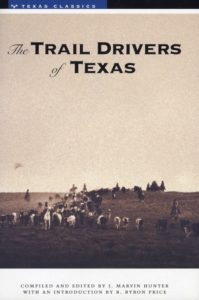
A true Texas Classic, The Trail Drivers of Texas is one of many county and personal histories available to readers. Most of the tales in this book are less flamboyant than county histories contain.
If your local library has a genealogy section, go in and look around. You might find a collection of old county histories that include biographical sketches of prominent citizens. If the volume was published before 1900, the citizens will likely be white males. After women formed civic-minded clubs in the early 20th century, a few women made the cut. Again they were white, only.
If you read some of the biographical sketches, the odds are you will be impressed with the accomplishments and pedigrees these individuals had. But don’t be fooled. There’s an interesting back-story to this process.
The American Centennial of 1876 was a patriotic event as full of excitement as was the second in 1976. Americans are proud of their nation, their families, and themselves. And they intended to share that pride with everyone.
Newspaper and book publishers saw a moneymaking endeavor from this pride. But the newspapermen and the publishing employees didn’t have time to write up all this information, so they created a system that increased their moneymaking. They hired a local person, usually a prominent man or woman who was fairly knowledgeable of local history to write the book. Accuracy was not required. In fact, there was an old saying that facts were not allowed to ruin a good story.
Then letters were sent to all the so-called leading citizens, those who were considered the crème de la crème in the community. For a specific amount, these citizens could submit their biography or that or a spouse or parent. Some grammatical editing may have cleaned up the biographies but the story was not changed.
County histories were the most numerous, but not the only histories published between 1876 through 1929. Miss Mamie Yeary, a true Daughter of the South and invalid who all her life lived with her family in Farmersville, Texas. She began writing letters to Confederate veterans asking for their stories. She collected hundreds; some simply answered her questionnaire while others provided in-depth accounts. In 1912 she published her collection as Reminiscences of the Boys in Grey along with the Constitution of the Confederate States of American and a listing of all Civil War engagements. Again, the work contains much that is factual, but slanted to the Confederate viewpoint.
A third class of personal histories is The Trail Drivers of Texas edited by Marvin Hunter. Hunter personally knew most of the men and few women featured in this book. Each had submitted a short piece about their experiences to the Trail Drivers of Texas Association at one point. Hunter used those memoirs in his book.
One time I found an extensive article about my Looney family of Virginia. Enthralled that here was a wonderful genealogy with such prominent family members, I later read that the author had created every word and was unable to present even one piece of documentation. So beware of anything too good to be true.
